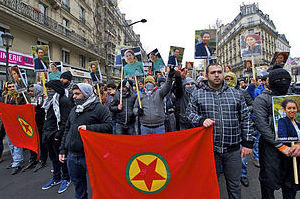Münir: PKK chose the most stupid answer to Erdogan
Metin Münir on the t24 news site writes that Erdoğan, after tasting his first election defeat, turned his ire and hate against HDP and its leaders. He ended the solution process. He sent the air force to bomb Kandil. PKK, the target of this attack, had many choices; without hesitation, the PKK chose the most stupid one. It started to spread terror. Maybe the leaders of the PKK, like all other aging warlords, could not accept that they are no longer in tune with the times, maybe they could not bring themselves to accept that the time has come for them to leave the initiative to the civilians. Whatever Erdoğan does, the most rational thing for the PKK to do is to pull out its warriors from Turkey and concentrate on the fight against ISIS.
Bursali: the Kurds are breaking away from Turkey
Orhan Bursalı in Cumhuriyet calls attention to a statement made by Kurdish leader Cemil Bayık: “No one can force us to pull out the guerilla from the north (from Turkey) or force us to lay down our arms. These are things that are never going to happen.” The leaders of the PKK/KCK have embraced the opportunity that has been offered them in Syrian Kurdistan; they are strengthening their positions there (through the PYD and with the help of the U.S. and the West); the focus of their policies is primarily to view Southeastern and Eastern Anatolia as forming one unit together with Syrian Kurdistan. The proclamations of “self-rule” in two provinces and six counties are not only a result of the [Turkish air force] bombings [of Kandil]; this is something for which they have prepared for a long time. The proclamations of Kurdish “self-rules” are one step: the message is “We don’t recognize the central government in Ankara.” They speak of “Revolutionary people’s war.” This means that we can expect smaller and bigger uprisings with the participation of the masses. It appears that the PKK/KCK has opted for policies that break off the bonds with Turkey.
Öztürk: the PKK is winning the public relations war
Kemal Öztürk in Yeni Şafak warns that the AKP is losing the public relation battle. The PKK/KCK/HDP coalition and the municipalities, associations, foundations, newspapers, radios and internet sites that it controls in the southeast have started a massive campaign, blaming all the deaths on the president and the AKP. This campaign is having a devastating effect on public opinion. Just as happened before the election, the public is turning against the AKP and the government. We also need to face the bitter truth: the discourse of the PKK is receiving much more attention in international media than the arguments of the government. I did not expect that the operations that are being undertaken to secure law and order in the cities would have a negative impact on the Kurdish people. But the PKK’s communication tactics and sustained efforts could undermine this expectation. The AKP needs to assure the people that the fight against terrorism is one thing and the solution process is something different. If the AKP fails to explain why it is fighting terror, what it is doing for the solution process, what it plans to do for the Kurdish people, it risks yet another election disaster.
Alpay: authoritarianism is inscribed in the genetic code of our republic
Şahin Alpay in Zaman writes that Turkey has certainly entered a period of instability that is not going to be short-lived. No doubt, President Erdoğan is the chief responsible for this. Yet this fact should not lead us to overlook the main reasons for why calm and stability continue to elude Turkey. A multicultural country like Turkey, with its multiple identities, can only become calm and stable when freedom and a pluralistic democracy has been put in place. Unfortunately, the genetic code of the republic does not allow for this. Erdoğan is faithful to the founding tradition of the republic when he views every kind of opposition as treason and when he does not tolerate that civil society becomes stronger. The second founding stipulation of the republic was that a modern society could only be constructed if the whole of society was made Muslim and if Islam was controlled by the state through the State Directorate of Religious Affairs. Indeed, the AKP, which stands for Turkish nationalism mixed with a sauce of Islamism, does not recognize the freedom of belief and continues to impose the religion of the State Directorate of Religious Affairs.
Erdoğan’s War: The Causes and Consequences of the Upsurge in Kurdish Violence
By Gareth Jenkins (vol. 8, no. 15 of the Turkey Analyst)
In recent weeks, Turkey has been wracked by an escalation in Kurdish-related violence. Not only could the upsurge have been prevented but there are fears that the worst may yet be to come. The fear is that President Recep Tayyip Erdoğan may order an even harsher crackdown over the weeks ahead and that, with its rural units depleted by deployments to Iraq and Syria, the PKK may increasingly respond by staging attacks, including more suicide car bombings, in the cities.



